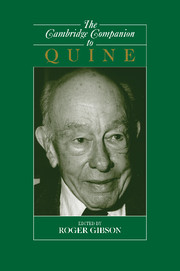Book contents
- Frontmatter
- Willard Van Orman Quine
- 1 Aspects of Quine’s Naturalized Epistemology
- 2 Quine on the Intelligibility and Relevance of Analyticity
- 3 Quine’s Meaning Holisms
- 4 Underdetermination of Physical Theory
- 5 Quine on Reference and Ontology
- 6 Indeterminacy of Translation
- 7 Quine’s Behaviorism cum Empiricism
- 8 Quine on Modality
- 9 Quine and Logical Positivism
- 10 Quine and Logic
- 11 Quine on Quine
- Selected Bibliography
- Index
7 - Quine’s Behaviorism cum Empiricism
Published online by Cambridge University Press: 28 May 2006
- Frontmatter
- Willard Van Orman Quine
- 1 Aspects of Quine’s Naturalized Epistemology
- 2 Quine on the Intelligibility and Relevance of Analyticity
- 3 Quine’s Meaning Holisms
- 4 Underdetermination of Physical Theory
- 5 Quine on Reference and Ontology
- 6 Indeterminacy of Translation
- 7 Quine’s Behaviorism cum Empiricism
- 8 Quine on Modality
- 9 Quine and Logical Positivism
- 10 Quine and Logic
- 11 Quine on Quine
- Selected Bibliography
- Index
Summary
I do consider myself as behavioristic as anyone in his right mind could be.
W. V. Quine, “Linguistics and Philosophy”INTRODUCTION
Quine is an advocate of naturalism, a view comprising two theses, one negative, one positive. The negative thesis is that there is no adequate first philosophy - that is, there is no a priori or experiential ground outside of science upon which science can either be justified or rationally reconstructed, as was the wont of many traditional epistemologists. The positive thesis is that it is up to science to inform us about what exists and how we come to know what exists.
On the negative side, if there is no adequate first philosophy, then epistemologies as disparate as Descartes' and Carnap’s fail of their purpose. While Descartes sought to deduce the truths of nature from a foundation of clear and distinct ideas, (early) Carnap sought to rationally reconstruct scientific discourse from a foundation of elementary experiences. Quine advances a series of philosophical arguments and considerations designed to establish the untenability of Descartes-like and Carnap-like epistemic projects. In short, Quine argues that Descartes-like efforts fail because not even the truths of arithmetic, let alone all the truths of nature, can be deduced from a (consistent) foundation of clear and distinct ideas, and he argues that Carnap-like efforts fail because a theory’s theoretical terms cannot be defined, even contextually, in observation terms.
- Type
- Chapter
- Information
- The Cambridge Companion to Quine , pp. 181 - 199Publisher: Cambridge University PressPrint publication year: 2004
- 6
- Cited by



